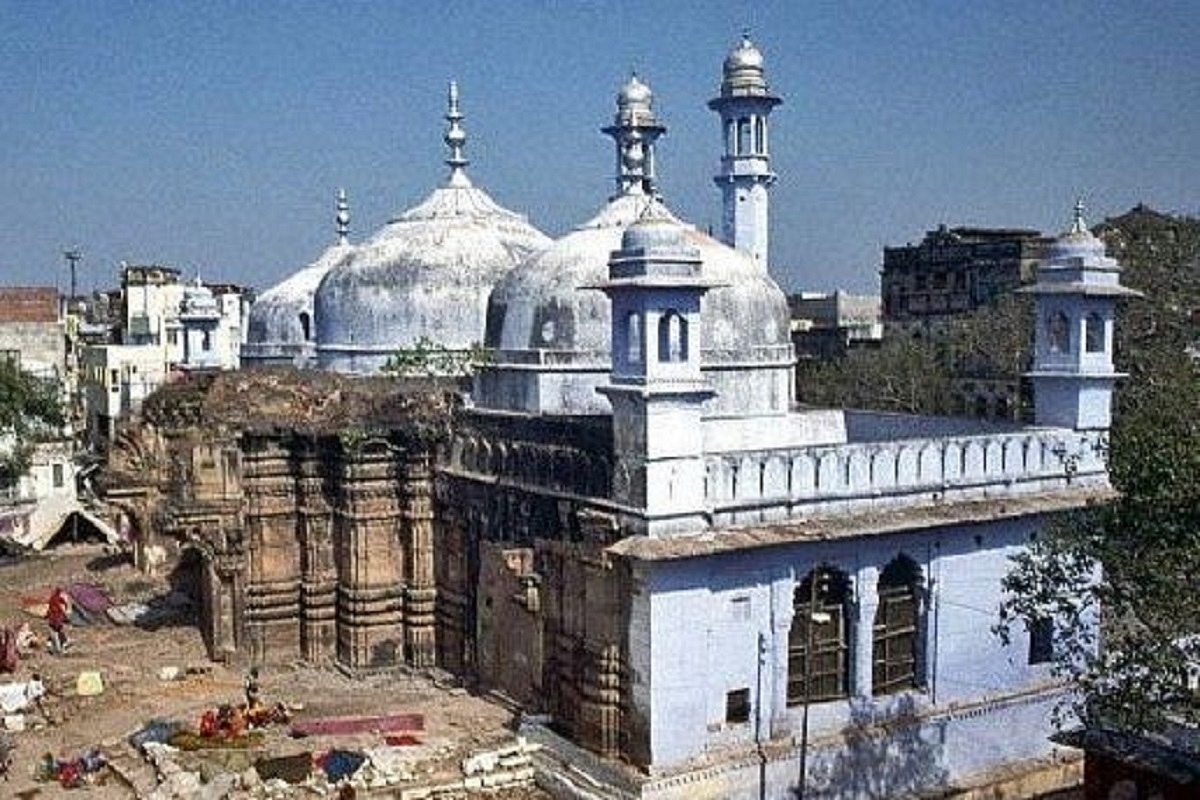Politics
Varanasi: ASI Begins Scientific Survey Of Gyanvapi After Allahabad HC Order

The disputed Gyanvapi structure premises. (Wikipedia)
A team of the Archaeological Survey of India (ASI) on Friday (4 August) morning began a scientific survey at the Gyanvapi premises in Varanasi.
The purpose of the survey is to determine whether the 17th-century disputed Gyanvapi complex has been constructed over a pre-existing structure of a Hindu temple.
The ASI team started the survey amid tight security arrangements.
This comes a day after the Allahabad High Court allowed the ASI to conduct the survey.
The HC dismissed the Gyanvapi mosque committee’s challenge to the order of a Varanasi district court asking for a “scientific investigation/ survey/ excavation” of the premises, saying “scientific survey is necessary in the interest of justice”.
Following the HC verdict, the mosque committee moved the Supreme Court challenging the order.
The Allahabad HC had earlier on 27 July reserved its judgment on a plea filed by the Gyanvapi mosque committee against the Varanasi district court's order for a ASI survey.
The court announced that it will deliver its verdict on 3 August.
As a result, the stay on the Archaeological Survey of India (ASI)-led survey was extended until the judgment is pronounced.
This development came after the Supreme Court had halted the ASI-led survey of the Gyanvapi mosque premises in Varanasi, providing time for a challenge. The Anjuman Intezamia Masajid Committee had taken the matter to the High Court, which was hearing the case.
In this matter, Anjuman Committee argued before the Allahabad High Court that the ASI was never a party to the suit and despite the same the Varanasi Court directed it to survey the Mosque premises. They argued that if a scientific survey is done in the way Hindu Women have argued, the entire Mosque premises would be destroyed.
While the Assistant Solicitor General of India contended that Ground Penetrating Radar method would be used by the ASI without causing any damage to the structure following the Varanasi Court’s order. However, the bench was not convinced with respect to the working procedure, and thereby the bench called for an affidavit from an ASI Official explaining the structure and details of the proposed survey.
Subsequently, an affidavit was filed by the ASI Official stating that survey work would be carried out without causing any damage to the structure, and added that a team from IIT Kanpur will be called for a radar survey and GPR survey.
Earlier, District and Sessions Judge Dr Ajaya Krishna Vishvesha had allowed an application by four Hindu women petitioners and directed the ASI to conduct a Ground Penetrating Radar (GPR) survey just below the three domes of the mosque.
The order allowed for excavation if necessary. However, the survey was supposed to exclude the wuzukhana area, which had been sealed last year on the orders of the Supreme Court after Hindu litigants claimed the presence of a Shivling there. On the other hand, Muslim litigants argue that the object is a fountain.
The district court's order was contested in the Supreme Court on 24 July, and Chief Justice of India DY Chandrachud's bench put the order on hold until 26 July to permit the mosque committee to approach the High Court against the district court's ruling.
The Supreme Court's bench directed that the petitioners be allowed to move the High Court to challenge the district court's order. Considering that the district court's order was issued on 21 July and the survey was underway, the petitioners were granted time until 5 pm on 26 July to seek appropriate relief in the High Court. Until then, the district court's order would not be enforced.
Support Swarajya's 50 Ground Reports Project & Sponsor A Story
Every general election Swarajya does a 50 ground reports project.
Aimed only at serious readers and those who appreciate the nuances of political undercurrents, the project provides a sense of India's electoral landscape. As you know, these reports are produced after considerable investment of travel, time and effort on the ground.
This time too we've kicked off the project in style and have covered over 30 constituencies already. If you're someone who appreciates such work and have enjoyed our coverage please consider sponsoring a ground report for just Rs 2999 to Rs 19,999 - it goes a long way in helping us produce more quality reportage.
You can also back this project by becoming a subscriber for as little as Rs 999 - so do click on this links and choose a plan that suits you and back us.
Click below to contribute.
Latest